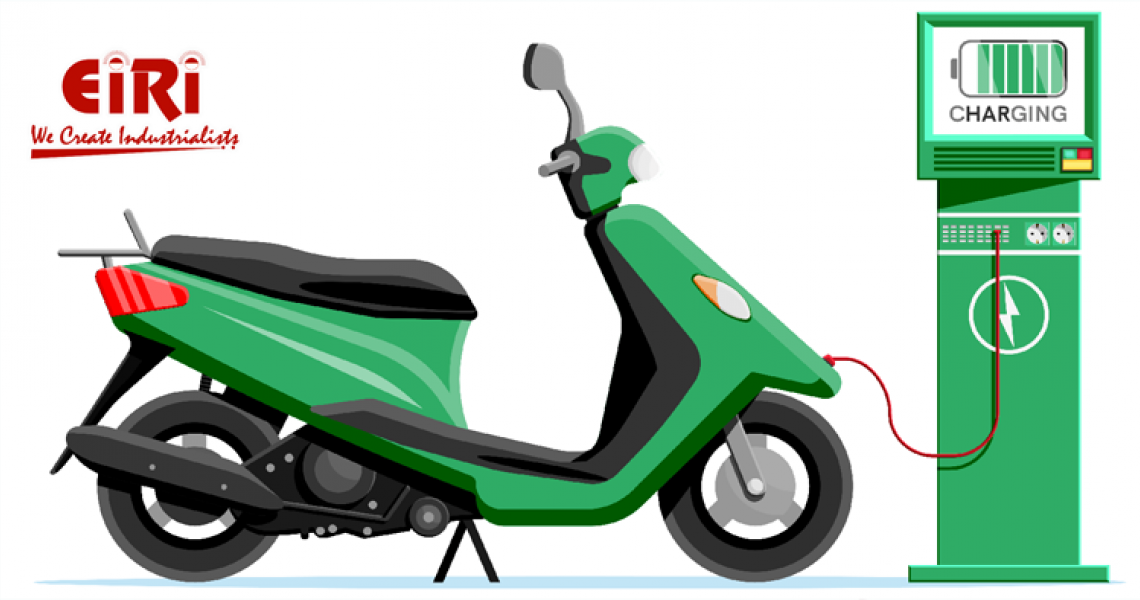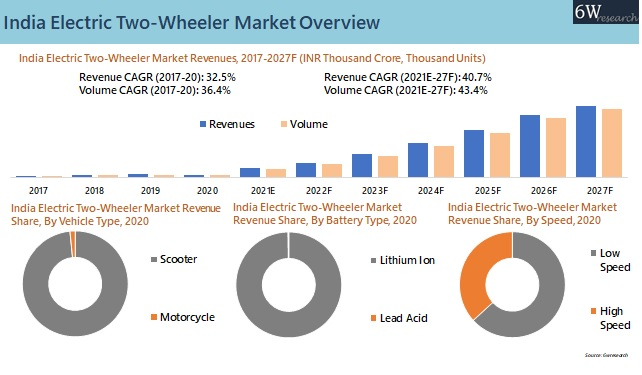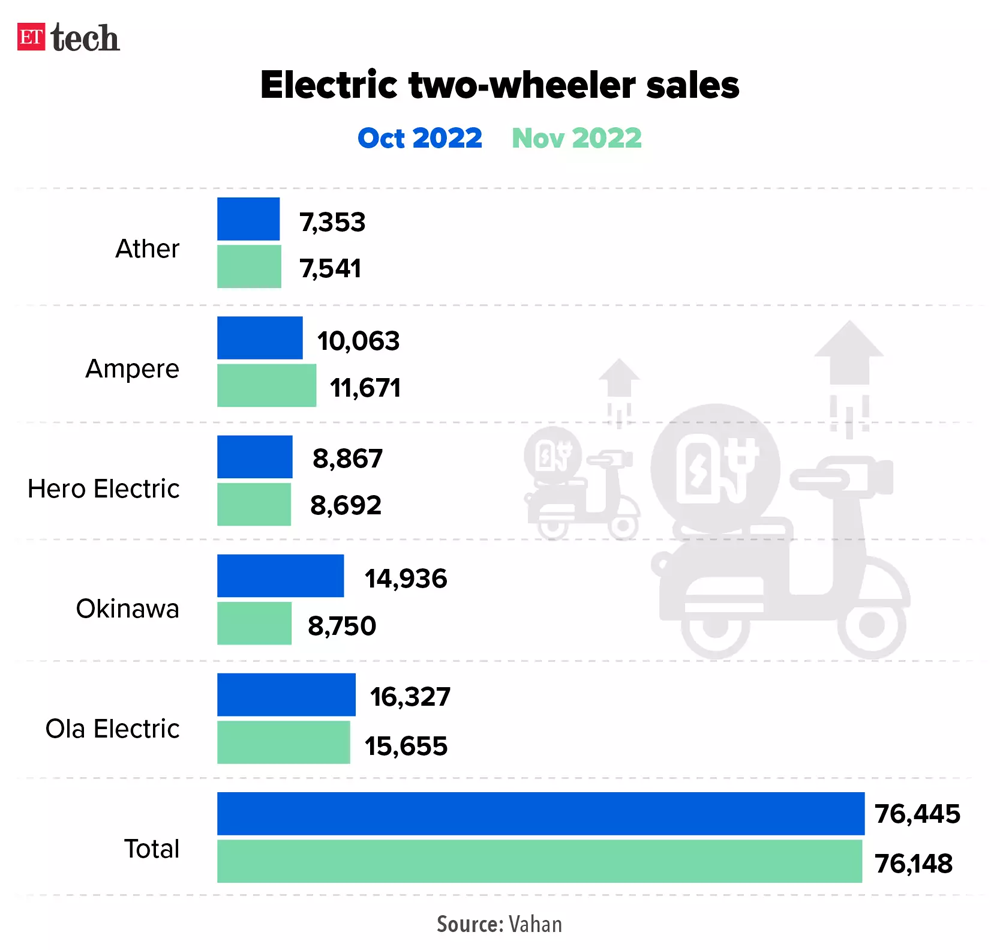The Rise of Electric Two-Wheeler Manufacturing: A Sustainable Solution for Urban Mobility

With increasing environmental concerns and a shift towards sustainable transportation solutions, the demand for electric vehicles (EVs) has witnessed significant growth, and the two-wheeler segment is no exception. Electric two-wheelers have emerged as a promising alternative to traditional internal combustion engine (ICE) vehicles, offering numerous benefits such as lower emissions, reduced operating costs, and enhanced riding experience. This surge in popularity can be attributed to several factors that are driving the adoption of electric two-wheelers in the market.
One of the primary reasons for the growing demand for electric two-wheelers is the urgent need to address environmental challenges, especially air pollution and greenhouse gas emissions. Electric two-wheelers produce zero tailpipe emissions, making them an eco-friendly choice compared to their conventional counterparts. As governments and individuals become increasingly conscious of the impact of transportation on the environment, electric two-wheelers offer a cleaner and greener mobility solution.

Electric two-wheelers have lower operating costs compared to ICE vehicles. The cost of electricity is significantly lower than that of conventional fuels, resulting in reduced refueling expenses. Moreover, electric two-wheelers have fewer moving parts and require less maintenance, leading to additional cost savings for the owners. As consumers seek cost-effective transportation options, electric two-wheelers provide an attractive proposition.
Many governments worldwide are promoting the adoption of electric vehicles through various incentives and subsidies. These incentives often include tax benefits, reduced registration fees, and financial incentives for purchasing electric two-wheelers. Additionally, some governments are also providing support for setting up charging infrastructure, further encouraging consumers to switch to electric mobility.
Advancements in battery technology and electric powertrains have significantly improved the performance and range of electric two-wheelers. Modern lithium-ion batteries offer higher energy density, allowing electric two-wheelers to cover longer distances on a single charge. Moreover, continuous research and development are leading to innovations that enhance battery life, charging speed, and overall efficiency, making electric two-wheelers a more viable option for daily commuting.
Electric two-wheelers are particularly well-suited for urban commuting due to their compact size and maneuverability. In densely populated cities facing traffic congestion, electric two-wheelers offer a practical solution to navigate through congested streets and reach destinations faster. They also contribute to reducing traffic congestion and improving overall urban mobility.
Electric two-wheelers are known for their smooth and silent operation. The absence of engine noise and vibrations provides riders with a more enjoyable and peaceful riding experience. Additionally, electric motors offer instant torque, resulting in quick acceleration and responsive performance.
As the demand for electric two-wheelers grows, manufacturers are introducing a diverse range of models to cater to different customer preferences and requirements. Electric scooters, motorcycles, and bicycles with varying power outputs and range capabilities are now available in the market, offering consumers a wider selection of options.
Key Players in the Electric Two-Wheeler Manufacturing Industry
The electric two-wheeler manufacturing industry is experiencing rapid growth and attracting significant attention from consumers and investors alike. As the demand for eco-friendly and efficient mobility solutions increases, several key players have emerged as leaders in this dynamic market. These companies have played a crucial role in shaping the electric two-wheeler landscape and driving innovation in the industry. Let's take a closer look at some of the prominent electric two-wheeler manufacturers and popular e-bike brands that are leading the way.
Hero Electric:
Hero Electric is one of the pioneers in the Indian electric two-wheeler market and is a leading manufacturer of electric scooters. With a strong presence in both urban and rural areas, Hero Electric offers a wide range of e-scooters that cater to various customer needs. The company is known for its reliable and affordable electric vehicles, making it a popular choice among consumers.
Ather Energy:
Ather Energy has made significant strides in the electric two-wheeler industry with its futuristic e-scooters. Based in India, Ather Energy is known for its high-performance electric scooters equipped with advanced technology and smart features. The brand's focus on innovation and design has garnered it a dedicated customer base and numerous accolades.
Bajaj Auto:
Bajaj Auto, a well-established player in the conventional two-wheeler market, has also ventured into electric mobility. The company's subsidiary, Bajaj Auto Electric, is actively involved in the production of electric scooters and e-bikes. Leveraging its extensive distribution network, Bajaj Auto is expanding the reach of electric two-wheelers across the country.
TVS Motors:
TVS Motors, another major player in the Indian automotive industry, has embraced electric mobility with its range of electric scooters and mopeds. The company's commitment to sustainability and technological advancements has positioned it as a key player in the electric two-wheeler space.
Yamaha Motor:
Yamaha, a renowned global brand known for its performance-oriented motorcycles, has also ventured into electric two-wheelers. The company's electric scooters combine Yamaha's expertise in engineering and design with eco-friendly mobility solutions.
NIU Technologies:
NIU Technologies is a Chinese electric two-wheeler manufacturer that has gained popularity worldwide. The brand specializes in stylish and technologically advanced electric scooters, attracting urban commuters with its smart features and connected capabilities.
Gogoro:
Gogoro is a Taiwanese electric scooter manufacturer that has revolutionized the industry with its innovative battery-swapping infrastructure. Gogoro's e-scooters come with swappable batteries, addressing the charging infrastructure challenges and providing seamless mobility solutions to users.
Revolt Motors:
Revolt Motors is an Indian electric two-wheeler startup that has garnered attention for its electric motorcycles. The company's focus on performance and affordability has made its e-bikes attractive to consumers seeking alternatives to traditional petrol-powered motorcycles.
Vespa Elettrica:
Vespa, an iconic brand known for its stylish and classic scooters, has introduced its electric scooter model, Vespa Elettrica. Retaining the brand's signature design, Vespa Elettrica offers a blend of heritage and eco-friendly mobility.

These are just a few of the key players in the electric two-wheeler manufacturing industry. As the market continues to grow, more companies are entering the space with innovative offerings, contributing to the transformation of the urban mobility landscape. With increasing consumer awareness and supportive government policies, the electric two-wheeler industry is poised for a bright and sustainable future.
The Challenges Faced by Electric Two-Wheeler Manufacturers and How They Overcome Them
The electric two-wheeler industry has witnessed significant growth in recent years, driven by the increasing demand for eco-friendly and sustainable mobility solutions. However, like any emerging sector, it faces several challenges that require innovative solutions. Let's delve into some of the key obstacles faced by electric two-wheeler manufacturers and how they are overcoming them to promote widespread adoption of electric vehicles.
Battery Limitations and Advancements Needed:
The primary challenge faced by electric two-wheeler manufacturers is the limitations of current battery technology. While lithium-ion batteries have become the standard for electric vehicles, there is a constant need for advancements to enhance energy density, reduce charging time, and improve overall battery life. To overcome this challenge, manufacturers are investing heavily in research and development to develop next-generation batteries with better performance and longevity.
Infrastructure Development for Charging Stations:
The success of electric two-wheelers heavily relies on the availability of a robust charging infrastructure. The limited charging stations, especially in smaller towns and rural areas, can discourage potential buyers from opting for electric vehicles. To address this challenge, manufacturers are partnering with governments and private enterprises to promote the installation of charging stations in key locations and urban centers. Additionally, innovative solutions such as battery-swapping stations are being explored to provide more convenient charging options.
Consumer Adoption and Awareness:
While the awareness of electric two-wheelers is increasing, consumer adoption remains a challenge. The initial cost of electric vehicles and concerns about range anxiety are common deterrents for potential buyers. To overcome this challenge, manufacturers are focusing on education and awareness campaigns to inform consumers about the benefits of electric two-wheelers, including lower operating costs, reduced carbon emissions, and environmental sustainability. Additionally, offering attractive incentives and subsidies can incentivize consumers to make the switch to electric vehicles.
Range and Performance:
Electric two-wheelers often face skepticism regarding their range and performance compared to traditional petrol-powered counterparts. Manufacturers are continuously improving battery technology and optimizing vehicle design to enhance the range and overall performance of electric two-wheelers. By providing reliable and high-performing electric vehicles, manufacturers aim to build consumer confidence in the technology.
Supply Chain and Component Sourcing:
Building a robust and efficient supply chain for electric two-wheelers can be challenging, especially for smaller manufacturers. Securing a steady supply of quality components, especially batteries and electric motors, is crucial for smooth production. To tackle this challenge, manufacturers are forging partnerships with reliable suppliers and ensuring the integrity of their supply chain to maintain product quality and consistency.
Policy and Regulatory Support:
The success of electric two-wheelers relies heavily on supportive government policies and regulations. Manufacturers are actively engaging with policymakers to advocate for favorable policies, such as incentives, subsidies, and tax benefits for electric vehicle adoption. Policy clarity and consistency can significantly boost the growth of the electric two-wheeler industry.
Market Forecast and Future Growth of Electric Two-Wheelers: Trends and Growth Opportunities
The electric vehicle (EV) revolution is rapidly transforming the global automotive industry, with electric two-wheelers emerging as a key segment driving sustainable mobility solutions. As concerns about environmental sustainability and rising fuel prices intensify, consumers are increasingly embracing electric two-wheelers as a cleaner and more economical mode of transportation. This article explores the market forecast and future growth opportunities for electric two-wheelers, highlighting the key trends shaping the industry.
Rising Demand for Sustainable Mobility:
The growing awareness of environmental issues and the need to reduce carbon emissions have propelled the demand for sustainable transportation options. Electric two-wheelers, powered by clean energy sources, have become an attractive choice for eco-conscious consumers. As governments worldwide set ambitious targets to reduce emissions and promote green transportation, the electric two-wheeler market is poised for significant growth.
Advancements in Battery Technology:
One of the critical factors influencing the adoption of electric two-wheelers is the continuous advancements in battery technology. Improvements in energy density, battery life, and charging infrastructure have significantly enhanced the range and performance of electric two-wheelers. As battery costs continue to decline, electric two-wheelers are becoming more accessible and competitive compared to traditional internal combustion engine vehicles.
Urbanization and Last-Mile Connectivity:
The rapid urbanization of cities has led to increased traffic congestion and challenges in last-mile connectivity. Electric two-wheelers offer a practical solution for navigating through crowded city streets and providing efficient last-mile connectivity. As urban populations grow, the demand for electric two-wheelers as a convenient and agile mode of transportation is expected to surge.
Government Incentives and Support:
Governments around the world are implementing various incentives and subsidies to promote the adoption of electric vehicles, including electric two-wheelers. These incentives may include tax benefits, subsidies on purchase, and reduced registration fees. Additionally, cities are introducing dedicated parking spaces and toll exemptions for electric vehicles. Such policy support is driving the demand for electric two-wheelers and contributing to their future growth.
Increasing Investment and Innovation:
The electric two-wheeler market has attracted significant investment from both established automobile manufacturers and startups. With a focus on innovation, manufacturers are introducing new models with improved features, performance, and aesthetics. Furthermore, electric two-wheeler companies are leveraging artificial intelligence and Internet of Things (IoT) technologies to enhance rider safety and convenience.
Growing E-Commerce Sector:
The booming e-commerce industry is fueling the demand for efficient logistics solutions, particularly for last-mile delivery. Electric two-wheelers, such as e-scooters and e-bikes, are increasingly being adopted by delivery service providers for cost-effective and eco-friendly deliveries. As the e-commerce sector continues to expand, the demand for electric two-wheelers for commercial use is projected to grow significantly.
Regional Market Expansion:
Electric two-wheelers are witnessing robust growth not only in developed countries but also in emerging economies. Countries in Asia, including India and China, are experiencing a surge in electric two-wheeler adoption due to favorable government policies, urbanization, and increasing disposable incomes. The expansion of the electric two-wheeler market into new regions presents vast growth opportunities for manufacturers.
In conclusion, the growing demand for electric two-wheelers is a testament to the increasing awareness of environmental sustainability and the need for cleaner and more efficient transportation. As technology continues to advance and governments actively support the adoption of electric mobility, the market for electric two-wheelers is poised for substantial growth. With benefits such as cost savings, reduced emissions, and improved riding experience, electric two-wheelers are paving the way for a greener and more sustainable future of urban mobility.










